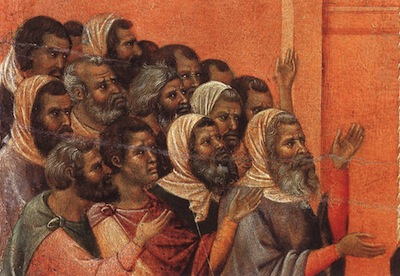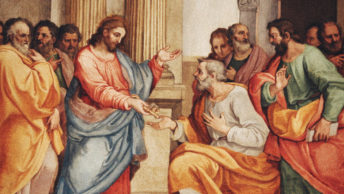 I am sure that we are all familiar with road construction. It seems that everywhere you turn nowadays some road is being either repaired, resurfaced, or entirely replaced. Have you noticed the size and complexity of some of the equipment that is being used in those projects? Enormous pieces of machinery! Those machines stand there as big, lifeless, pieces of equipment, till an operator sits in the driver’s seat. Then when that driver starts it up, it comes to life and does what he commands it to do.
I am sure that we are all familiar with road construction. It seems that everywhere you turn nowadays some road is being either repaired, resurfaced, or entirely replaced. Have you noticed the size and complexity of some of the equipment that is being used in those projects? Enormous pieces of machinery! Those machines stand there as big, lifeless, pieces of equipment, till an operator sits in the driver’s seat. Then when that driver starts it up, it comes to life and does what he commands it to do.
As big and complex as some of that equipment is, they are like tinker toys in comparison to the design and complexity of the human body. You have heard me say this before. There are those who like to believe that we are physical beings who just happen to contain a soul or a spirit. That belief is incomplete and inaccurate, because we are not physical beings. We are, in reality, spiritual beings who just happen to be residing temporarily within this physical body. It is because of our spirit, residing within this body of ours, that our bodies do our bidding.
The Gospel reading that the Church uses for the weekend of October 27, Luke 18:9-14, presents a Pharisee who prays in a blatantly self-righteous manner and a tax collector whose prayer reflects deep humility. Both examples were meant to be extreme and both can lead to misunderstandings for us who are not familiar with first century culture.
First of all, in defense of the Pharisees, we should understand that the Pharisees were experts in the Mosaic Law and they considered it their responsibility to interpret the Law and instruct others on how to incorporate it in their daily lives. They were looked upon as being “holy” individuals. And the example of a Pharisee displaying such arrogance and self-righteousness would have been seen as unusual and out of character. The Jews in Jesus’ audience would not have expected a person, whom they viewed so positively, to behave in that manner.
On the other hand, collecting taxes from one’s fellow citizens for a foreign government was an occupation that was forbidden by Jewish Law. For a tax collector to even enter the temple would have been seen as unacceptable. And they certainly would not expect to see such a sinner praying. But more shocking still to Jesus’ listeners was the fact that by humbly asking for God’s mercy, the sinful tax collector went home justified.
The two stories, therefore, contradict their expectations and their understanding. A Pharisee would not be expected to behave in such an arrogant and self-righteous manner and a sinful tax collector would not be expected to be justified by a simple, short prayer.
As I said earlier, we are spiritual beings. These bodies of ours were created in the image and likeness of God. The talents and abilities that we possess are therefore given to us as a gift from God, to help us in transforming the world into a divine dwelling place. In other words, we were given these gifts and abilities to aid us in shining the light of God into the darkness of our world. The Talmud, or the primary source of Jewish Law, teaches every Jew to say “The world was created just for me.” In other words, each and every one of us is responsible for the entire world.
Arrogance, or considering oneself superior to someone else who may not possess the same talents and abilities as you, is pure foolishness. But on the other hand, we must not confuse humility with meekness or low self-esteem. True humility, is simply recognizing that the talents and abilities that we possess are God given gifts, and the things that we are able to accomplish through the use of these gifts are simply a reflection or expression of God. Therefore, denying or refusing to recognize one’s talents and abilities is not humility, it is also foolishness.
We can easily recognize the error in the arrogance displayed by the Pharisee. But if the penitent prayer that was recited by the tax collector was the only prayer he prayed for the rest of his life, then we most certainly would not want to identify ourselves with that behavior either. Do not make the mistake of seeing this Gospel as a Gospel of guilt. There must come a time when we recognize the mercy of God and accept His forgiveness and then move on. God willingly wants to bless us with the gift of His forgiveness. He wants to bless us so that we can be a blessing to others. We cannot be a blessing to others if we are arrogant. Neither can we be a blessing to others if we are continually suffocated by a sense of our own unworthiness.
We were blessed with these physical bodies of ours, bodies that were created in the image and likeness of God. We were given certain skills and abilities so that, just like the equipment that is used in road construction, we are able to transform the world and pave the way for the Kingdom of God. And we do this by humbly allowing the power of God to work through us, through the gifts, talents and abilities He has given us. We are to love and serve our fellow man confident of our ability yet free of arrogance.








